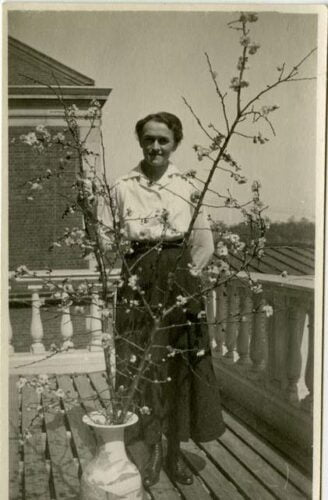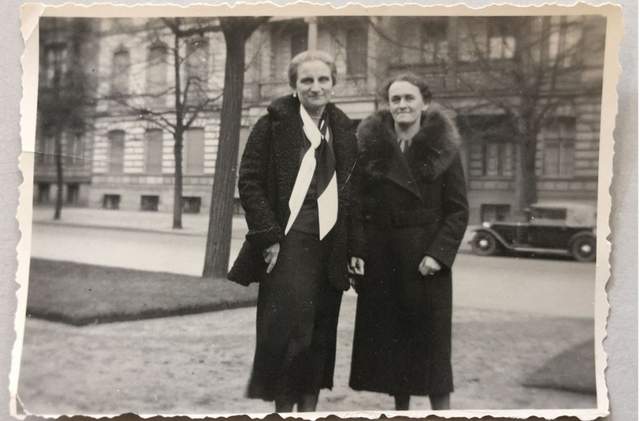Adventurous life of a chambermaid in Japan
Adventurous life chambermaid Japan

Marta Richter was a chambermaid to German diplomat Wilhelm Solf and his wife Hanna, who went down in history as the Nazi resistance. Together with Hanna Solf, Marta Richter was even put into Gestapo custody.
All her life, Marta Richter had kept Wilhelm Solf’s coat, which had been punctured and later moth-eaten, for herself. “His Excellency wore it during the great earthquake in Japan in 1926,” she used to say in her old age about the almost reliquary revered garment. It is probably better than the former chambermaid of the ambassador’s wife and later Nazi resistance fighter Hanna Solf, with whom she was even in prison during the Third Reich, did not notice how the Enz flood in 1978 wholly ruined the shreds of coat that had been stored in Bietigheim in the meantime. The shown passport and photographs were donated to the museum of the city of Bietigheim, Germany. Adventurous life chambermaid Japan





In 2012 I visited the Political Archive of the German Foreign Office in Berlin. Besides, other outstanding passports historical relevant binders, I could also inspect the binders of Solf, which gave me a vivid insight look at his diplomatic and private life. Adventurous life chambermaid Japan
Wilhelm Solf was a German scholar, diplomat, jurist, and statesman. He joined the German Foreign Office (Consular Service) on 12 December 1888 and was assigned to the Imperial German Consulate General in Calcutta on 1 January 1889. He joined the Colonial Department of the Foreign Office (Kolonialabteilung des Auswärtigen Amtes) and, in 1898, was assigned as a district judge in Dar es Salaam in German East Africa for a short period. Wilhelm Solf, at age 38, became the first Governor of German Samoa on 1 March 1900.
After his return from Samoa, Solf became Secretary (Staatssekretär) of the German Colonial Office (Reichskolonialamt) to 1918, traveling extensively to the German protectorates in West and East Africa in 1912 and 1913. The outbreak of World War I caused Germany’s colonial possessions to be invaded by Britain (including Dominions), Belgium, France, and Japan. With the defeat of Germany imminent and the likelihood of revolution growing, he was appointed what turned out to be the last of the Imperial Foreign Ministers in October 1918. He resigned his post as Foreign Minister on 13 December 1918 with the onset of the German revolution. Adventurous life chambermaid Japan
Between then and 1920, he was Vice President of the Deutsche Kolonialgesellschaft. From 1920 to 1928, he served as the German chargé d’affaires and later ambassador to Japan; his tenure proved to be fruitful, as he was instrumental in restoring good relations between the two wartime enemies, culminating in the signing of the German-Japanese treaty of 1927. On Solf’s return to Germany and retirement from government service, he became the Chairman of the Board of the Deutsches Ausland-Institut based in Stuttgart.
He supported the election of retired Field Marshal Paul von Hindenburg as German President. Wilhelm Solf was married to former Johanna Dotti, who later formed the anti-Nazi Tea Party. Solf was the author of Weltpolitik und Kolonialpolitik (Foreign policy and colonial policy, 1918) and Kolonialpolitik.
Mein politisches Vermächtniss (Colonial policy, my political legacy, 1919).Adventurous life chambermaid Japa
FAQ Passport History
Passport collection, passport renewal, old passports for sale, vintage passport, emergency passport renewal, same day passport, passport application, pasaporte passeport паспорт 护照 パスポート جواز سفر पासपोर्ट
1. What are the earliest known examples of passports, and how have they evolved?
The word "passport" came up only in the mid 15th Century. Before that, such documents were safe conducts, recommendations or protection letters. On a practical aspect, the earliest passport I have seen was from the mid 16th Century. Read more...
2. Are there any notable historical figures or personalities whose passports are highly sought after by collectors?
Every collector is doing well to define his collection focus, and yes, there are collectors looking for Celebrity passports and travel documents of historical figures like Winston Churchill, Brothers Grimm, Johann Wolfgang von Goethe. Read more...
3. How did passport designs and security features change throughout different periods in history, and what impact did these changes have on forgery prevention?
"Passports" before the 18th Century had a pure functional character. Security features were, in the best case, a watermark and a wax seal. Forgery, back then, was not an issue like it is nowadays. Only from the 1980s on, security features became a thing. A state-of-the-art passport nowadays has dozens of security features - visible and invisible. Some are known only by the security document printer itself. Read more...
4. What are some of the rarest and most valuable historical passports that have ever been sold or auctioned?
Lou Gehrig, Victor Tsoi, Marilyn Monroe, James Joyce, and Albert Einstein when it comes to the most expensive ones. Read more...
5. How do diplomatic passports differ from regular passports, and what makes them significant to collectors?
Such documents were often held by officials in high ranks, like ambassadors, consuls or special envoys. Furthermore, these travel documents are often frequently traveled. Hence, they hold a tapestry of stamps or visas. Partly from unusual places.
6. Can you provide insights into the stories behind specific historical passports that offer unique insights into past travel and migration trends?
A passport tells the story of its bearer and these stories can be everything - surprising, sad, vivid. Isabella Bird and her travels (1831-1904) or Mary Kingsley, a fearless Lady explorer.
7. What role did passports play during significant historical events, such as wartime travel restrictions or international treaties?
During war, a passport could have been a matter of life or death. Especially, when we are looking into WWII and the Holocaust. And yes, during that time, passports and similar documents were often forged to escape and save lives. Example...
8. How has the emergence of digital passports and biometric identification impacted the world of passport collecting?
Current modern passports having now often a sparkling, flashy design. This has mainly two reasons. 1. Improved security and 2. Displaying a countries' heritage, icons, and important figures or achievements. I can fully understand that those modern documents are wanted, especially by younger collectors.
9. Are there any specialized collections of passports, such as those from a specific country, era, or distinguished individuals?
Yes, the University of Western Sidney Library has e.g. a passport collection of the former prime minister Hon Edward Gough Whitlam and his wife Margaret. They are all diplomatic passports and I had the pleasure to apprise them. I hold e.g. a collection of almost all types of the German Empire passports (only 2 types are still missing). Also, my East German passport collection is quite extensive with pretty rare passport types.
10. Where can passport collectors find reliable resources and reputable sellers to expand their collection and learn more about passport history?
A good start is eBay, Delcampe, flea markets, garage or estate sales. The more significant travel documents you probably find at the classic auction houses. Sometimes I also offer documents from my archive/collection. See offers... As you are already here, you surely found a great source on the topic 😉
Other great sources are: Scottish Passports, The Nansen passport, The secret lives of diplomatic couriers
11. Is vintage passport collecting legal? What are the regulations and considerations collectors should know when acquiring historical passports?
First, it's important to stress that each country has its own laws when it comes to passports. Collecting old vintage passports for historical or educational reasons is safe and legal, or at least tolerated. More details on the legal aspects are here...
Does this article spark your curiosity about passport collecting and the history of passports? With this valuable information, you have a good basis to start your own passport collection.
Question? Contact me...

